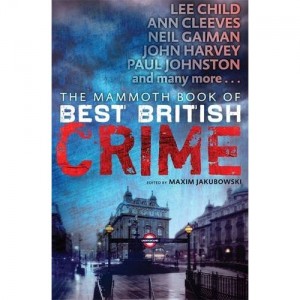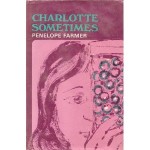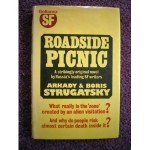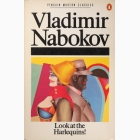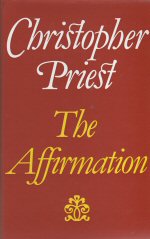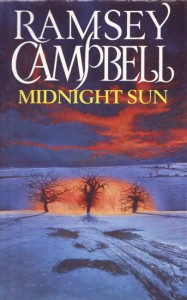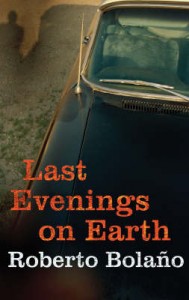I’ve never much liked the term ‘non-genre SF’ because I feel it runs the danger of deepening an already false divide between science fiction and the literature of the mainstream and thus making the ghetto mentality around SF still more entrenched. More recently though I’ve come to see some sense in it, if only for the purposes of describing a difference not so much in style as of approach. Wanting to write science fiction should never be treated as a literary crime, any more than it should commit you as a writer to a particular style. But it has always been and remains true that whilst there are writers who feel wholly committed to the idea of SF as a life’s project, there are also those who are what are sometimes called ‘tourists’, writers more usually associated with the mainstream, who approach SF out of curiosity once or twice but who never revisit. Perhaps they enjoyed SF when they were younger but feel they’ve ‘grown out of it’. Perhaps they’re a bit ashamed of admitting their weird proclivity in front of their LRB friends. Whatever their reasons, there’s a sizeable chance that many of those writers who come visiting from over the mainstream fence haven’t read much science fiction since their late teens or early twenties. They almost certainly don’t have much idea of what’s going on in the field at the moment. It’s because of this, more than any other reason, that their contributions to the literature of science fiction are often seen by ‘real’ SF readers and writers as somewhat reactionary or out of date and why, somewhat ironically, they tend to be rather looked down on.
I freely acknowledge that writers who are more usually associated with the literary mainstream do not always, indeed do not often, produce the best SF, and although I often find myself fighting a corner for non-genre SF, when it comes to individual novels I often find it disappointing. But science fiction can always use a kick up the arse, the kind of literary jolting that infuses it with new ideas about literary form and new ways of seeing itself. Sometimes jolts like this come from the literary side of the fence rather than the SFnal side, and occasionally a non-genre work will come along that goes all the way out there science fictionally and raises the bar for the rest of us. I believe that Cormac McCarthy’s The Road was one such novel. I was up until 3.30am reading that book, and there aren’t many novels I’ve read since my twenties that I can say that about. Waking just a couple of hours later and still thinking about it, I remember pulling back my curtains and looking out over southeast London, thankful and relieved that my city was, at least for the moment, still there. The Road made me re-evaluate my own reality, and that’s one of the ways I knew it was not just a great novel, but great SF too.
But more often the kind of non-genre SF you find gathering the most attention in the broadsheets is not nearly so strong. Usually these books are dystopias, because that’s more or less the only SF template that the literary mainstream seems comfortable with – better the devil you know, after all, and while Ian McEwan and Margaret Atwood may not have read The Dervish House or Dhalgren or The Separation you can bet your life they will have read Brave New World, The Day of the Triffids and probably The Road as well. Non-genre SF is often very heavy on premise, and those writers who venture into it tend to introduce any science fictional concepts they do try with a kind of ‘woo look, no hands!’ underlining, wheeling out their Big Idea in such a way as to suggest that no one’s ever thought of it before, when in fact if they’d actually read any SF post-Wyndham they’d realise loads of people have done it before, probably decades ago and with a greater degree of originality and flair.
This doesn’t mean their novels are bad – there was a fragility, a quality of sincerity to Kazuo Ishiguro’s Never Let Me Go that made me like it a lot, and although Jane Rogers’s The Testament of Jessie Lamb was not the most innovative SF in the world, it had a writerly sensibility, an approach to the material and most importantly to characterisation that made the book live in the mind and gave it weight – but when they are bad they are horrid. Karen Thompson Walker’s The Age of Miracles was one of the most uncomfortable reads of this year for me and not in a good way. In terms of its SF it was dreadful – only the most cursory logic had been applied to the central conceit, while the book’s shallowly complacent, California-centric worldview had me wincing with embarrassment on almost every page. When reviewing the book for The Observer, Edward Docx put the problems of this novel down to the very fact that it was SF:
But for this reader at least, it is mildly depressing that so nimble, delicate and emotionally sophisticated a novel should find itself burdened by such sci-fi oafishness.
Docx argues that The Age of Miracles would have been a better book if it had been allowed to become the ‘beautifully observed coming-of-age story’ that it wanted to be. I couldn’t have disagreed more. As a coming-of-age novel, far from being nimble, delicate and emotionally sophisticated, the book seemed to me to be strikingly naive and limited, stuffed with cliché and with not one thing apart from its admittedly cack-handed SF premise to distinguish it from a thousand other American first novels of its type. It gives me no pleasure to say it, because I wanted to like the book, but The Age of Miracles felt very much like writing-by-numbers.
And yet this novel, acquired for $1m, was marketed by its mainstream imprint as the pinnacle of science fictional achievement. For science fiction writers the squandering of such superlatives is particularly galling, as it is impossible to escape the suspicion that many of the critics who lavished praise on the book hadn’t picked up a science fiction novel since they had to read Nineteen Eighty-Four for ‘O’ Level.
So can non-genre SF ever wholly embrace science fiction? My instinct would be to say yes, of course it can, and for much of its length the book I have just finished reading, Tobias Hill’s 2003 novel The Cryptographer, would seem to be the perfect justification of such an argument. Hill is an award-winning poet, and it’s perhaps not surprising that The Cryptographer, whilst it is set in the near future, was immediately claimed by the mainstream as the kind of novel that cannot be SF because it’s proper literature. In her review for The Guardian, A. S. Byatt was specific in describing The Cryptographer as not science fiction:
This is neither a thriller, nor a futuristic utopia or dystopia. Tobias Hill has his own elegant, clear and complex, meditative way of inventing worlds…. He has a masterly control of hinted, rather than elaborated, changes.
It’s beautifully written and well imagined, in other words, both factors that in the minds of some critics at least immediately disqualify it from being SF. Also there are no aliens. This is all predictable enough. What is perhaps equally predictable but more of a pity is that Hill’s novel has attracted relatively little notice from within the SF community. I think this is a shame, because to my mind The Cryptographer is precisely that kind of novel that is worth examining from a science fictional as well as from a literary standpoint.
The Cryptographer is told from the point of view of Anna Moore, an executive – or should we say agent? – of the British Inland Revenue. When we meet her at the start of the novel, she has just been assigned to the case of John Law, the world’s first quadrillionaire, inventor of ‘Soft Gold’, a universal computer currency that has been adopted on a worldwide scale. The Revenue has no reason to suspect John Law of any impropriety, and Anna is told that the investigation is a random check. Anna soon uncovers what appears to be a minor anomaly in his firm’s accounts; Law immediately pays what he owes and the file is closed. But Anna cannot seem to let go. She is mesmerised by her client, not so much by his wealth but by the person of John Law himself, the particular vulnerabilities of a man who would appear to have everything. She has suspected from the first that something is going on beneath the glossy surface of Law’s empire and is determined to root out the truth.
But then she is a slow thinker, Anna, suited to her work. Not brilliant, only sedulous. It is her talent to miss nothing, given time. (p150)
What she discovers is that an undercover organisation of top hackers is about to crack the code Law has created, and that if they succeed it could lead to the collapse of society as she knows it. John Law has secreted away massive reserves behind a wall of code, a bulwark of protection for himself and his family. His main concern is not for himself, however, but for what he has created – the perfectly abstract invention of Soft Gold, and his brilliant but vulnerable young son Nathan, who suffers from a severe form of congenital diabetes. The only thing Law wants to buy now is time – time to crack his own code and so discover its weakness before his enemies discover it for him and bring it down.
The last decade has seen a riot of literary speculation into the subject of financial meltdown – fiction and non-fiction, killer thrillers, stark analyses, blame games, righteous outrage and proposed solutions. What it has seen less of is any attempt to determine or describe the metaphyiscs of our current situation, to ask the philosophical question of what is money? The Cryptographer goes bravely out of its way to redress this balance. Hill’s summation of what he terms ‘The Fall’ is as devastating in its economy as it is in its failsafe grasp of the essentials:
By the time the floors are closed it is already too late. It is as if, through money, time has slipped backwards. In less than two hours, the world has been set back scores of years. The faces broadcast, later wiped out, sagging with the understanding that something has gone wrong, and so critically wrong that decades have been swept away, like ships and houses by great waves. Whole lives, if lives can be measured in money, and they can, since they are. In greed and generosity and desire. (p175)
It is with his exquisite practice of poetry – the distilling of a large idea into the compass of a few perfected words – that Hill infuses the body politic of science fiction with a new vitality. A. S. Byatt is right when she says that Hill has his own clear and complex, meditative way of inventing worlds. In Hill’s future London, there are hints that John Law may be ‘risking his life’ in deceiving the Revenue, while to read books is an eccentric pastime (‘you do still read books?’); a character’s handwriting is ‘scrawny, out of practice’, the personal letter written on paper is itself an almost extinct curiosity. It is ‘just two years since they cancelled the dollar’, and yet the scents and sensations of old, ‘touchable’ money itself, ‘the sour smell of alloy, the arcane traces of urine and cocaine on old notes’, are already the stuff of nostalgia. At a New Year’s party at Law’s vast London estate (he has purchased and relandscaped the whole of Erith), we see through Anna’s eyes how wealth can change the laws of physics if it is vast enough as, for a few hours at least, winter is transformed into spring:
It feels like the proof of something. That money can do anything, change whatever it touches. Like Midas, she thinks. The king who changed the world to gold. The gold that changed the king. She wonders if that is true of money, after all, though it is not what she has always believed. It is not what she sees in her own world, where people are not immutable but, still, stubborn-hearted, born into themselves. Ungolden. Where winter, despite everything, stays winter. (p129)
Hill’s uses of the present-impossible are deft and light – we are not projected or info-dumped inside our own possible future so much as already walking towards it under our own power. Most crucially though, the novel’s smooth narrative flow never becomes obfuscated by the demanding nature of its ideas. The Cryptographer contains a mass of science fictional concepts and complex information, but we are guided effortlessly through those ideas in a language that is crystalline in its form, deceptive in its simplicity, and never less than beautiful. The Cryptographer is a unique and persuasive, original work of science fiction that contains not one word of science fictional jargon. Anyone who likes to read, whether they are habitual readers of SF or not, could pick up this book and be equally thrilled and disturbed by what it contains. It is a novel that requires concentration, but it is not a selfish book; for all its complexities it is still, at its heart, a novel about people. The Cryptographer shows us a future, but it shows it to us not through the eyes of an over-eager SF writer but of the people who have to live in it. It is not ‘about’ the future – it’s about us. And like all the best science fiction, it hasn’t dated. When Hill wrote The Crpytographer, the future he imagined was still twenty years away. With the passage of time it is now less than half that – and yet unlike so many other, more extravagant works of SF, Hill’s London 2021 does not feel less real the closer we approach it in realtime, but frighteningly more so. Anyone reading The Cryptographer today could be forgiven for believing that the manuscript was completed not a decade ago, but only yesterday.
But just how good is Hill’s novel really, as SF? I have to say I changed my mind on this point as the story progressed, and if you’d asked me the question fifty pages in and again at the end you’d have received two different answers. The literary excellence on display in The Cryptographer makes the book timeless, and as a mainstream novel it could be argued that it is wholly satisfying. We see a story unfold, and a conclusion of sorts is reached. The protagonist, Anna Moore, goes on a journey and is changed by it – she is not the same person at the end of the book as she was at the beginning. In a formal sense, The Cryptographer is beautifully worked. The coolness of its interior spaces – the obsidian, brushed steel and glass surfaces of the various office buildings where power is wielded then wrestled away then seized again – is mirrored in the novel’s language, an essay in restraint and control, the taut self-mastery that conceals deep emotion. But in terms of its science fiction, I came away with the regrettable feeling that The Cryptographer pulls its punches. The sense, so ominously present in the first half of the novel, that something huge and disastrous is about to be unleashed, ends in anticlimax. We are told that the collapse of Soft Gold has set the world back by as much as a hundred years, but the effects, the specifics of what this means are kept firmly off stage. We see little or nothing of what the world crash means in and for the lives of ordinary people. At one point, a character compares the collapse of Soft Gold with the disastrous hyper-inflation suffered by Weimar Germany in the 1920s. If you read a novel like Hans Fallada’s 1932 classic Kleiner Mann, Was Nun? you will come away in no doubt as to the shattering effects of this disaster, the way it broke millions of individual lives and propelled an idealistic nascent democracy into the arms of the most notorious megalomaniac of modern times. For Fallada’s protagonist, the eponymous, hard-working ‘little man’ with his new marriage and his modest dreams, everything, but everything, is at stake, and reading about what happens to him is a sobering, moving, and perhaps most importantly a deeply anger-making experience.
For the characters in The Cryptographer, the extent of their personal losses seems risible in comparison. They remove themselves to Scottish islands or to the north of Finland, where they take refuge in the kind of scrubbed-down, pleasantly remote cottages you might just as easily find in The Guardian’s travel supplement, and enjoy simple home-cooked food prepared by honest artisans who never went in for ‘the Electric’ in the first place. They give up their computers and take the radical step of using their old CD ROMS as drinks coasters (yes, really). They resign from the IR and spend time cataloguing their father’s collection of antiquarian books instead.
For all the talk of risk, there is no real risk here. The only things that Anna loses are things she was getting tired of in any case.
What I felt at the end of The Cryptographer was disappointment. I neither believed in nor cared about the ‘romance’ between Anna Moore and John Law, and I felt the immense promise of this novel had been wasted on trifles.
As someone who’s been known to argue that SF can often work better when it’s toned down a little, I found it amusing and ironic when I discovered that in the case of The Cryptographer what I actually felt in need of was more science fiction. I wanted the writer to follow through, to have the courage of his initial convictions, to take responsibility for the apocalypse he had created. As a novel like The Age of Miracles most aptly demonstrates, using SF as a sparkly stage dressing is an act of literary cowardice that is likely to rebound on you. There are those who maintain that the essential difference between SF and Fantasy is responsbility, and whilst mainstream writers do all manner of fine and subtle things with SF, what The Cryptographer finally shows us is that not to be true to science fiction’s core strength as a literature of ideas is, in the end, to do it a disservice. SF can learn a lot from the mainstream – the SF writer who reads Cormac McCarthy and doesn’t feel moved to up their game probably has their head in the sand – but mainstream writers like Hill and like Walker have just as much, if not more, to gain from reading some real science fiction.
If they want to write books that keep you up until three in the morning, that is.
